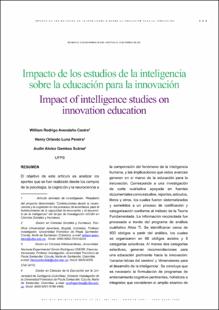Impacto de los estudios de la inteligencia sobre la educación para la innovación
Impact of intelligence studies on innovation education
Artículo de revista
2021-08-01
Revista boletín redipe
Colombia
El objetivo de este artículo es analizar los aportes que se han realizado desde los campos de la psicología, la cognición y la neurociencia a la comprensión del fenómeno de la inteligencia humana, y las implicaciones que estos avances generan en el marco de la educación para la innovación. Corresponde a una investigación de corte cualitativa apoyada en fuentes documentales como estudios, reportes, artículos, libros y otros, los cuales fueron sistematizados y sometidos a un proceso de codificación y categorización conforme al método de la Teoría Fundamentada. La información recolectada fue procesada a través del programa de análisis cualitativo Atlas Ti. Se identificaron cerca de 500 códigos a partir del análisis, los cuales se organizaron en 68 códigos axiales y 8 categorías selectivas. Al menos dos categorías selectivas, generan recomendaciones para una educación pertinente hacia la innovación: ‘características del cerebro’ y ‘dimensiones para el desarrollo de la inteligencia’. Se concluye que es necesario la formulación de programas de entrenamiento cognitivo pertinentes, holísticos e integrales que consideren el amplio abanico de variables, factores y elementos asociados con la inteligencia. The objective of this article is to analyze the contributions that have been made from the fields of psychology, cognition and neuroscience to the understanding of the phenomenon of human intelligence, and the implications that these advances develop in the framework of education for the innovation Correspond to a qualitative research based on documentary sources such as studies, reports, articles, books and others, which were systematized and sometimes a process of codification and categorization according to the Method of Grounded Theory. The information collected was processed through the Atlas Ti qualitative analysis program. About 500 codes are identified from the analysis, which are organized into 68 axial codes and 8 selective categories. At least two selective categories, recommended classifications for an education relevant to innovation: “characteristics of the brain” and “dimensions for the development of intelligence”. It is concluded that the formulation of relevant, holistic and integral cognitive training programs that consider the wide range of variables, factors and elements associated with intelligence is necessary. The objective of this article is to analyze the contributions that have been made from the fields of psychology, cognition and neuroscience to the understanding of the phenomenon of human intelligence, and the implications that these advances develop in the framework of education for the innovation Correspond to a qualitative research based on documentary sources such as studies, reports, articles, books and others, which were systematized and sometimes a process of codification and categorization according to the Method of Grounded Theory. The information collected was processed through the Atlas Ti qualitative analysis program. About 500 codes are identified from the analysis, which are organized into 68 axial codes and 8 selective categories. At least two selective categories, recommended classifications for an education relevant to innovation: “characteristics of the brain” and “dimensions for the development of intelligence”. It is concluded that the formulation of relevant, holistic and integral cognitive training programs that consider the wide range of variables, factors and elements associated with intelligence is necessary.
Descripción:
impactos de los estudios de la inteligencia sobre la educacion para la innovacion.pdf
Título: impactos de los estudios de la inteligencia sobre la educacion para la innovacion.pdf
Tamaño: 517.6Kb
 PDF
PDF
 LEER EN FLIP
LEER EN FLIP
Título: impactos de los estudios de la inteligencia sobre la educacion para la innovacion.pdf
Tamaño: 517.6Kb
 PDF
PDF
 LEER EN FLIP
LEER EN FLIP
















